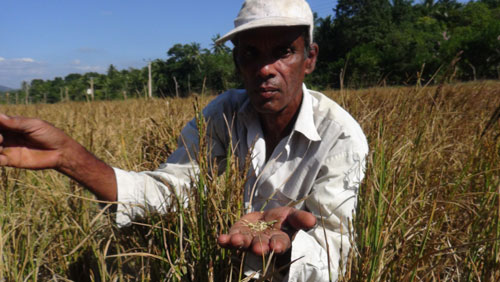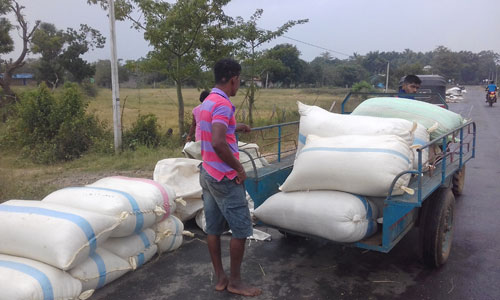News
Farmers versus millers: Rice price fight brewing again
Once again, this harvest season, paddy farmers are at the mercy of private millers who have begun descending on the districts and as usual the Paddy Marketing Board, which is under the Rural Economic Affairs Minister P Harrison, is unable to buy the entire produce of the country.

Dambulla: This poor farmer laments that lack of water is ruining his harvest. Pic by Kanchana Kumara Ariyadasa
Farmers also complain that the PMB is not yet prepared to make purchases and notices of purchasing prices have not been made available. They fear prices will be depressed if rice is imported and that they will not get a fair deal for their harvest from paddy buyers.
Farmer associations are calling on the government to review plans to import rice and step up purchases of available stocks without allowing private dealers to hoard paddy and capitalise on the situation.
Farmers say that already, dozens of lorries owned by leading mill owners are lining up in areas where the harvest is being gathered and agents are bargaining for prices below what the government offers.
The Paddy Marketing Board has offered a price of Rs 38 per a kilo for Nadu varieties and Rs 41 for Samba rice varieties. Farmers claim that private buyers are offering between Rs 17 and Rs 29.
All-Island Farmers Federation, national organiser, Namal Karunaratne told the Sunday Times that large rice mill owners, government officials and ministers are encouraging rice imports that will undermine domestic prices.
“Some farmers risked crop failure and they grew rice using rain water and the available fertiliser. But they are facing hardships since the large-scale millers buy paddy at low prices saying they already have large stocks,’’ he said.
He said that harvesting has begun in Jaffna, Ampara, Batticaloa, Trincomalee and Hambantota. Mr Karunaratne said that there are quantities of rice harvest of past years remaining at mills while recent rice imports also remain at stores, therefore he explained that there is no need for importation of rice.
“Apart from the anticipated stocks of the ongoing harvest there are remaining harvests of 2016, 2017 as well as recently imported rice stocks left with millers.
Therefore there are enough stocks to feed the country till September” he said. He said the import of rice is unnecessary when large amounts of stocks remain with millers.
Meanwhile, farmers as well as leaders of farmer groups complained that the Paddy Marketing Board is yet to be ready to buy the harvest, allowing large scale millers to benefit from the situation.
Killinochchi farmer, P Shivakumaran said that harvesting is nearing completion. During the first two weeks of the harvest the price of a kilo of rice was Rs 17, but at the end of the harvesting season, a kilo of Nadu was selling at Rs 29.

Trinco: Good harvest for farmers but at the mercy of private millers. Pic by Amadoru Amarajeeva
“Though the PMB says that they are purchasing Nadu for Rs 38 per kilo and Samba for Rs 41, prices are being controlled by a few large-scale millers,” he said. He also claimed that the although the PMB says that the District Secretaries too can purchase paddy by using Treasury funds and sell the paddy to PMB warehouses, the district secretaries are unaware of such an arrangement.
Indika Paranawithana, president of Kantale Govi Viyapara Ekamuthuwa, said that in Trincomalee, more than 100,000 acres had been cultivated. Out of the total, 22,500 acres were cultivated using rain water and 50% was damaged.
A bumper harvest is expected from growers who used irrigation water.
Mr Pranawithana also said that the PMB has not started purchases, nor has the agency posted notices on purchase prices and venues. “When notices of government paddy purchases are published, the millers tend to compete and pay us well, but, until then, big millers in Polonnaruwa come to purchase the paddy at low prices,’’ he said. He said imports drive down paddy purchase prices. But costs of cultivation, such as fertiliser, labour, and machinery are high. For seven years now, water had not been available for the Yala season, he said.
Another head of a farmer association in Hambantota, Kalum Chandana, said that Lungamwehera paddy harvest was delayed for more than a month due to lack of fertiliser and water at the right time.
Fertiliser supply and subsidies were delayed by the government. He also said the paddy harvest will have to be sold cheaply.
PMB chairman M B Dissanayake, said that purchases will begin when paddy from the irrigated fields is harvested.
He also said Cabinet approval is awaited for paddy to be bought through the District Secretariats, which will make purchases with funds from the Treasury.
“We have already informed the District Secretaries and officials in charge of PMB stores that we will purchase paddy at Rs 38 per kilo of Nadu varieties and Rs 41 per kilo of any Samba rice variety.” He said however, the PMB can only buy 6% to 10% of the produce.
Some District Secretaries said they are making preparations for paddy purchases. The District Secretary of Kilinochchi, Suntharam Arumainayagam, said purchases have begun. But he said, some farmers sell to millers who buy more and pay more. Mr Arumainayagam said there was ample space to store paddy.
The District Secretary of Trincomalee, N A A Pushpakumara, said discussions were held about paddy purchases through a representative of the District Secretary. He said that they will be given state funds to purchase and store paddy in PMB warehouses.
“We will allow the private millers to purchase paddy cultivated with rainwater but will start purchasing the main harvest,’’ he said. He said that they will only purchase 200 MT of paddy from each farmer.
| MAHA RICE CROP BELOW AVERAGE | |
| Sri Lanka’s Maha season paddy crop, which accounts for about 65% percent of annual production, is expected to partially recover from last year’s severely reduced level but still be below average, the UN’s Food and Agriculture Organisation says in a report. Harvesting of the Maha season paddy began in mid-January, with the bulk to be collected between February and March. Below-average rains throughout October 2017, coupled with low water levels in major reservoirs, delayed sowing operations in the North Central, North Western, Central and Uva Provinces, the FAO says. Official information from mid-December 2017 indicated that, while planting progress for the 2018 main season surpassed last year’s drought-reduced level, it lagged well behind normal years. As a result, the 2018 main season paddy output is expected to partially recover from last year’s severely reduced level but still be below average, the FAO estimates. |

